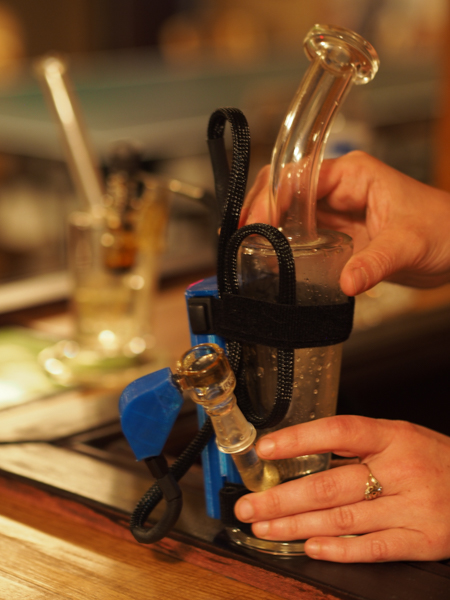
This weekend, Alaska saw its first-ever job fair for careers in commercial cannabis, offering a glimpse of how the semi-legal marijuana industry is taking tentative steps towards professionalism and profits.
Theresa Collins shuffled between prospective employers and job-seekers inside the enormous, high-ceiling room that serves as the venue for Pot Luck Events, the marijuana-friendly company she runs at 420 West 3rd Avenue in downtown Anchorage. And yes, that is the actual address. Collins worked with the newly-formed Alaska Cannabis Growers Association to organize an event matching would-be workers with jobs that don’t yet exist.
“Growers, trimmers, bud-tenders,” Collins rattles off. And then there are all the clerical jobs she expects trained employees from other sectors to bring into the offices accompanying future dispensaries and green-houses, “Accounting, admin–there’s going be all kinds of different, new jobs in this industry.”
Collins wants Alaska’s new commercial pot sector to be legit–law-abiding and mature, in part because it makes for good business.
To that end, though the club has a distinct aroma of pot smoke, no one was visibly consuming. Collins banished dues-paying club members who wanted to imbibe to the VIP section in the back. The rest of the venue was all business.
“If you’re going to sit down and smoke a joint before you sit down for an interview,” Collins said, shaking her head, “I don’t think it really shows that you’re very professional.”
Collins was impressed with the turnout–more than a hundred people stopped by and registered information for jobs.
But was not the case for one attendee, who asked to be called Morgan, was hunched over a table filling out a form with questions like “What is your relationship with cannabis?” and “What experience do you have working with cannabis, and in what capacity?”
Morgan was at the fair because she knows a lot about pot and thinks the business environment will likely be more laid back than regular retail or office work. But she was disappointed by the event.
“It’s a little bit skinnier than I guess I thought it would be,” said Morgan, who anticipated a more traditional job fair set-up, with booths, hand-outs, and way more prospective employers. “It seems a little bit more like a cattle-call.”
The forms could be dropped off with any of the three businesses present, including Alaska Cannabis Staffing. Owner Kyle Houghton is setting up a data-base of employees he hopes to sell to companies needing both permanent and seasonal laborers.
“I gotta build a data-base first, before I have any value to offer employers,” Houghton said, standing next to the laptops used to help patrons set up login credentials. After that they were free to upload resumes whenever they wanted.
Houghton explained that it was still a bit early in the commercialization process to hold an event like Saturday’s. “Most of the jobs are gonna come next year,” he said.
Alaska Cannabis Staffing’s business model isn’t new–a cross between a temp agency and a job site–but it depends on a robust industry that does not yet exist. Much like insurance brokers and equipment suppliers, Houghton’s is an ancillary business that stands to profit from what many expect to be a green gold rush.
Which is exactly why Houghton chose the business he did: “I want to be involved without being involved, I don’t want to be heavily regulated.”

In the VIP lounge, I talk with a business owner who will be very involved–Justin of Green Dream Farms (he asked that I not use his last name). We’re in the smoking area because Justin is showing me one of the products he hopes to eventually sell: dab, an essential oil extracted from large quantities of cannabis. Concentrated products like dab have been a bit of a boogey-man in municipal and state-level conversations over how to regulate marijuana.
But Justin believes this is a misunderstanding.
“I think it’s a healthier, safer, faster product,” he tells me. Justin hasn’t smoked “flower” (budding marijuana) in five years, partly because his pulmonary health was suffering from all the tar that came from ingesting so much plant matter. He loads a small daub of dab into a battery-powered pipe called an oil rig that heats the substance to the point of combustion at 700 to 850 degrees. “It’s almost an instant heat,” he adds, demonstrating.
Justin’s business doesn’t officially exist. There is no store-front or commercial processing facility, and lawmakers have yet to finalize rules about permits or controversial products like concentrates.
While many variables are still unknown, recruiting early has crucial benefits to Justin’s business strategy.
“It’s all future marketing and branding,” he said, matter-of-factly, “we just kinda wanna get our name out there.”
As for coming to the job fair in particular, “We want a team assembled before licensure,” Justin explained, “to make sure that when we are licensed we can hit the ground running.”
For job-seeking Morgan, it was a good event for networking, but didn’t yield many tangible job prospects.
“I think that there’s a lot of work to be had, it’s just not readily available yet,” she said.
The state anticipates the first commercial marijuana operations to open for business in May of 2016.
Zachariah Hughes reports on city & state politics, arts & culture, drugs, and military affairs in Anchorage and South Central Alaska.
@ZachHughesAK About Zachariah




